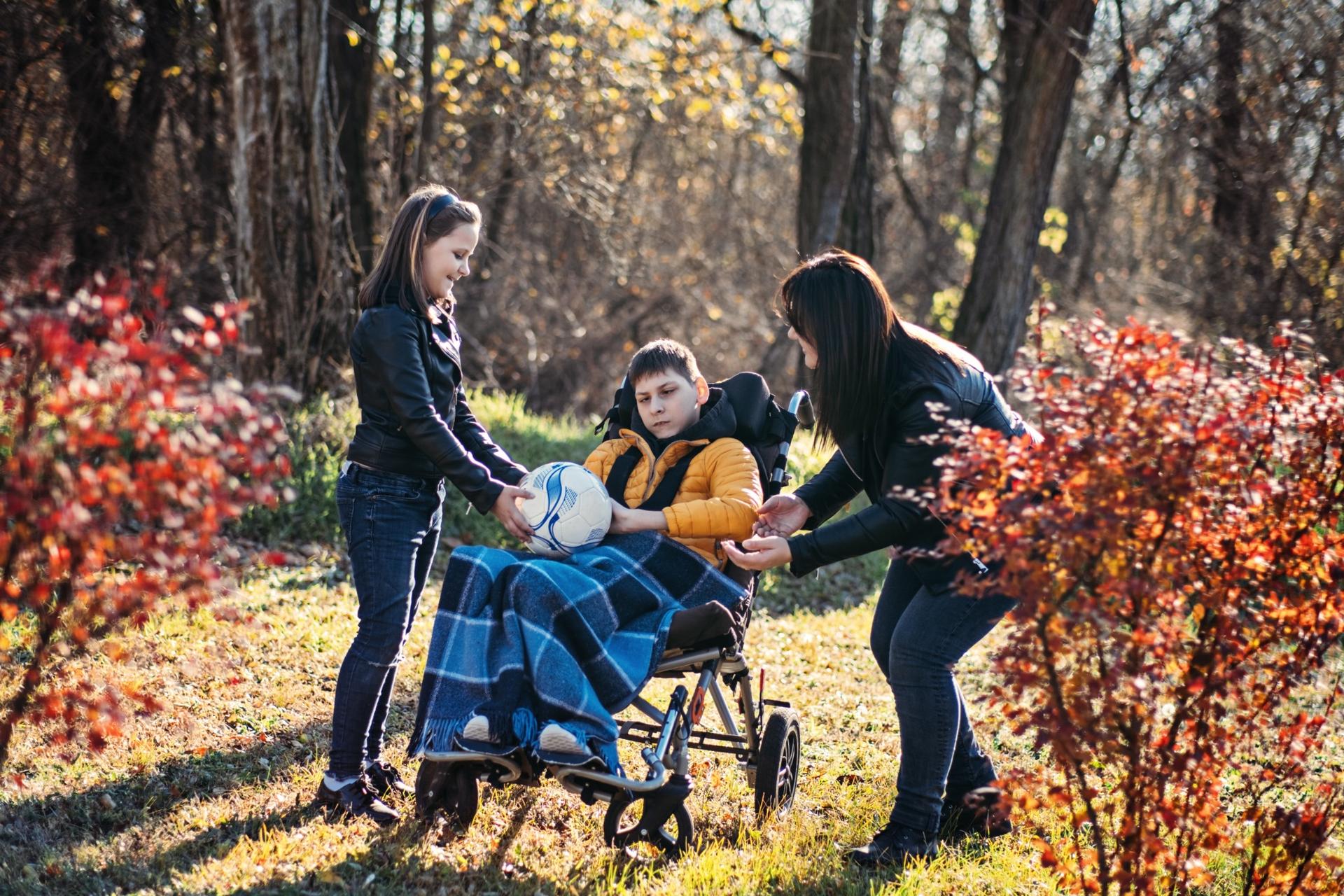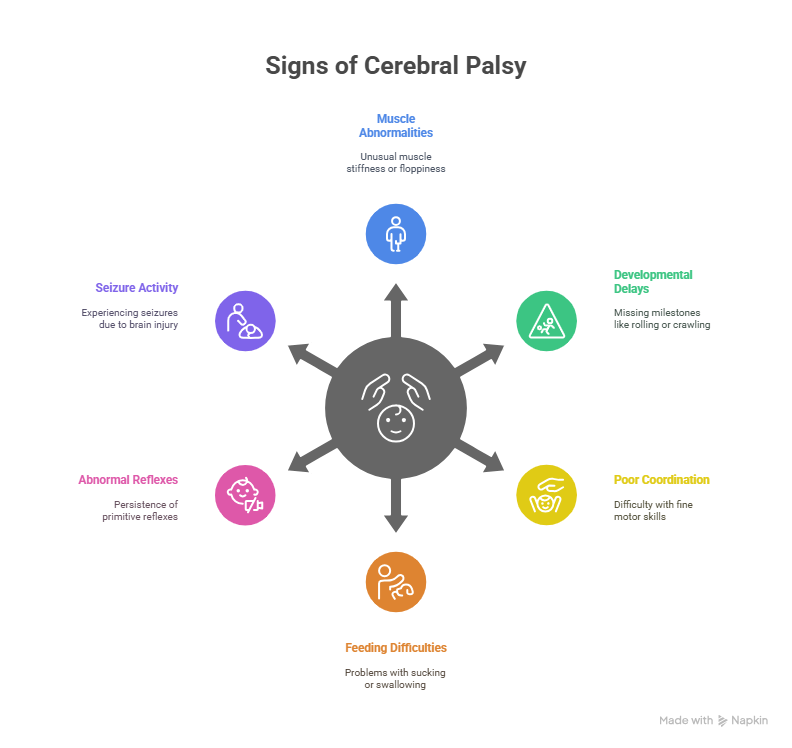
When your child is diagnosed with cerebral palsy, the weight of uncertainty and fear can feel overwhelming. Many families don’t realize that their child’s condition may have been preventable through proper medical care during pregnancy, labor and delivery, or shortly after birth.
At Frank Spector Law, we understand the profound impact a cerebral palsy diagnosis has on the entire family. Our experienced Baltimore cerebral palsy lawyer knows that behind every case is a child whose life has forever changed due to medical negligence, and parents searching for answers and justice.
✔️ When medical professionals fail to meet the standard of care expected during childbirth, the consequences can be devastating and permanent.
If your child’s cerebral palsy resulted from preventable medical mistakes, you have the right to pursue compensation for the lifelong care your child will need.
Our case results reflect decades of experience securing life-changing compensation for families affected by preventable medical errors, including those involving cerebral palsy, surgical injuries, and hospital negligence. These outcomes demonstrate our commitment to holding healthcare providers accountable when their mistakes cause permanent harm:
- $3,400,000: Awarded a $3.4 million settlement for injury to a child in Baltimore
- $3,000,000: Awarded a $3 million settlement for a child injured during surgery in Montgomery County
- $2,500,000: Awarded a $2.5 million settlement for a baby injured at birth in Washington, DC
If you believe medical negligence played a role in your child’s cerebral palsy, don’t wait to get answers—contact Frank Spector at 443-845-1456 or reach out through our contact form for a free, compassionate consultation.
Your legal options if malpractice caused your child’s cerebral palsy
Maryland law recognizes that families may pursue compensation when medical malpractice causes lifelong disabilities like cerebral palsy. The compensation available covers not just immediate medical expenses, but the full spectrum of care your child will need throughout their lifetime.
This includes specialized therapies, adaptive equipment, home modifications, and lost future income potential. More than financial relief, pursuing a claim provides emotional validation that what happened to your child was preventable and gives families a sense of justice during an incredibly difficult time.
How to know if you have a cerebral palsy case in Baltimore?
Several key elements must be present to establish a potential medical malpractice case for your child’s CP diagnosis. Understanding these factors can help you determine whether your family has grounds for legal action.
- Medical relationship: A doctor-patient relationship must have existed between your family and the healthcare provider during pregnancy, birth, or early infancy. This relationship establishes the duty of care that was owed to you and your baby.
- Breach of standard: The medical professional must have failed to provide care that meets accepted medical standards for their specialty. Expert medical testimony is typically required to establish what the appropriate standard of care should have been.
- Causation link: There must be a direct connection between the healthcare provider’s negligent actions and your child’s brain injury that resulted in cerebral palsy. This often requires extensive medical record review and expert analysis.
- Significant damages: The injury must have caused substantial damages, including medical expenses, ongoing therapy costs, special education needs, and impact on quality of life. Given the lifelong nature of cerebral palsy, these damages are typically substantial.
📺 Watch: How to Prove Birth Injury Caused Cerebral Palsy or Developmental Delays
In this video, we explain how our legal team evaluates cerebral palsy cases, including how medical experts determine whether negligence contributed to your child’s condition and how we gather the evidence needed to prove your case.
Compensation for families raising a child with CP
Maryland’s comprehensive approach to medical malpractice damages means families can recover both economic and non-economic damages for their child’s cerebral palsy. These awards recognize the full impact of the condition on the child and family, as outlined in Md. Code, Cts. & Jud. Proc. § 11-108, which governs how non-economic damages are assessed in malpractice claims.
💡 Economic damages like medical costs and long-term care are not capped, while non-economic damages (e.g., pain and suffering) are subject to annual limits that adjust based on the year of the claim.
- Ongoing medical care: Coverage for specialized physicians, regular monitoring appointments, medications, and medical equipment needed throughout your child’s life.
- Rehabilitation therapies: Physical therapy to improve motor skills, occupational therapy for daily living activities, and speech therapy for communication challenges that many children with cerebral palsy face.
- Educational support: Special education services, adaptive learning tools, and additional support services needed to help your child reach their educational potential despite their disability.
- Home modifications: Wheelchair accessibility improvements, bathroom adaptations, and other home changes necessary to ensure your child can live safely and independently.
- Lost income potential: Compensation for the decreased earning capacity your child may experience due to their disability, calculated over their expected lifespan.
- Pain and suffering: Recognition of the physical discomfort, mental anguish, and reduced quality of life your child experiences due to their condition.
Additional reading: chorioamnionitis lawsuit
How to get in touch with our Baltimore cerebral palsy lawyer
We make it easy for families to connect with our experienced legal team when they need answers about their child’s condition and potential legal options.
- Telephone: Call Frank directly at 443-845-1456 – when you call, you will speak to Frank personally about your child’s case
- Online contact: Visit our contact page to send us a message or request a consultation through our secure online form
Our free consultation means there’s no cost to discuss your child’s case and learn about your legal options.
Who can be held accountable in a birth injury claim?
💡 Multiple healthcare providers may share responsibility when medical negligence causes cerebral palsy, and our attorneys understand how to investigate all potential sources of accountability in your case.
- Obstetricians and gynecologists: Primary responsibility often lies with the delivering physician who made critical decisions during labor and delivery. They must recognize signs of fetal distress and take appropriate action to prevent brain damage.
- Nurses and midwives: Hospital staff who monitor mother and baby during labor have duties to recognize warning signs and communicate concerns to physicians. Failure to properly monitor or delay in reporting problems can contribute to injuries.
- Anesthesiologists: These specialists bear responsibility when medication errors or complications during epidural or cesarean procedures contribute to a lack of oxygen to the baby’s brain.
- Hospitals and medical facilities: Healthcare institutions can be held liable for inadequate staffing, faulty equipment, poor protocols, or failure to have appropriate emergency procedures in place during high-risk deliveries.

Can cerebral palsy be prevented?
Not all cases of cerebral palsy are preventable, as some result from genetic factors or unavoidable complications. However, many cases that lead to successful malpractice claims stem from preventable medical errors during the prenatal period, labor, or immediately after birth.
According to Cerebral Palsy Guide:
- 70% of cerebral palsy cases are caused by events during pregnancy
- 20% occur due to complications during labor and delivery
- Roughly 10% of asphyxia (lack of oxygen) events result in cerebral palsy
Healthcare providers have established standards of care designed to minimize risks to both mother and baby during pregnancy and delivery. When these standards are not followed, the consequences can be devastating.
The legal significance lies in determining whether the brain damage could have been avoided with proper medical intervention, appropriate monitoring, or timely decisions about delivery methods.
Can cerebral palsy be related to medical malpractice?
Yes, cerebral palsy can absolutely result from medical malpractice during pregnancy, labor, delivery, or the newborn period. Studies show that thousands of children develop cerebral palsy each year due to preventable medical errors.
The condition occurs when brain damage happens before, during, or shortly after birth due to lack of oxygen, infection, or trauma. When healthcare providers fail to recognize warning signs, delay necessary interventions, or make critical errors in judgment, they may be responsible for your child’s condition.
At our firm, we understand that proving this connection requires a thorough investigation of medical records and expert testimony to demonstrate how proper care could have prevented your child’s injury.

How our Baltimore cerebral palsy lawyer can help
⚖️ Our experienced birth injury attorneys provide comprehensive legal representation that addresses every aspect of your child’s cerebral palsy case with the compassion and expertise your family deserves.
- Thorough investigation: We work with medical experts to review all prenatal, delivery, and postnatal records to identify where the standard of care was breached. Our team examines fetal monitoring strips, medication records, and communications between healthcare providers.
- Expert medical testimony: We collaborate with board-certified specialists in obstetrics, neonatology, and neurology who can explain how your child’s injury could have been prevented. These experts help establish the connection between negligent care and your child’s condition.
- Comprehensive damage calculation: We work with life care planners and economists to project the full cost of your child’s lifetime needs, ensuring no future expense is overlooked. This includes medical care, therapy, equipment, and lost earning capacity.
- Insurance negotiation: Our personal injury law experience means we know how insurance companies attempt to minimize payouts and we’re prepared to fight for the compensation you deserve. We handle all communications so you can focus on your child’s care.
Why choose Frank Spector Law as your Baltimore cerebral palsy attorney?
Frank Spector has 30 years of experience helping people and is committed to providing answers to those who have questions about medical malpractice and personal injury, backed by the following accreditations:
- “Superb” rating on Avvo
- Selected to Super Lawyers: 2008 – present
- Verified Justia profile
- Verified D.C. Bar member: 1993 – current
Our approach combines deep legal knowledge with genuine compassion for families dealing with birth injuries and their long-term consequences.
We understand that no amount of money can undo your child’s injury, but proper compensation can provide the resources necessary for your child to receive the best possible care and live the fullest life possible. Our track record demonstrates our commitment to achieving results that make a meaningful difference for our clients.
When you call Frank Spector at 443-845-1456, you will speak to Frank personally. Our no-obligation consultation means you pay nothing unless we win your case, removing financial barriers that might prevent families from seeking justice.
Statute of limitations in Maryland
⚠️ Maryland law provides specific timeframes for filing medical malpractice claims, and missing these deadlines can permanently bar your right to compensation for your child’s cerebral palsy. Understanding the Maryland medical malpractice statute of limitations is key for protecting your family’s legal rights.
For adult patients, the deadline is generally three years from the date of injury. However, birth injury cases involving children follow different rules that can extend these timeframes significantly.
When a child suffers a birth injury, families typically have until the child’s 21st birthday to file a claim. This extended timeline recognizes that cerebral palsy symptoms may not be fully apparent immediately after birth, and families need time to understand the full extent of their child’s condition.
The complexity of these timing rules makes it vital to consult with an experienced cerebral palsy lawyer in Baltimore as soon as you suspect medical negligence may have played a role in your child’s condition.
📺 Watch: How Long Do I Have to File a Baltimore Cerebral Palsy or Developmental Delay Case?
In this video, we explain the legal deadlines for filing a cerebral palsy claim in Maryland, including how the statute of limitations is extended for children and why early action is so important.
General information on cerebral palsy to keep you informed
Understanding cerebral palsy helps families make informed decisions about treatment, care planning, and legal options. Knowledge empowers parents to advocate effectively for their children’s needs.
What is cerebral palsy, and how does it happen?
Cerebral palsy is a group of permanent neurological disorders that primarily affect movement, posture, and muscle coordination. According to the Centers for Disease Control and Prevention, about 1 in 345 children (3 per 1,000 8-year-old children) in the United States have been identified with CP, making it the most common motor disability in childhood.
The condition results from damage to the developing brain that occurs before, during, or shortly after birth. Understanding these statistics helps families realize they are not alone in facing this challenge and that resources and support are available.
The brain damage that causes CP is non-progressive, meaning it doesn’t worsen over time. However, the symptoms and functional limitations may change as a child grows and develops.
While some cases result from genetic factors or unavoidable complications, many are caused by preventable medical errors, including oxygen deprivation during delivery, untreated infections, or delayed emergency interventions.
Common medical mistakes that cause cerebral palsy
Medical errors during pregnancy and delivery are, unfortunately, common causes of cerebral palsy that could be prevented with proper care and attention to warning signs.
- Delayed cesarean section: Failing to perform a timely C-section when fetal distress is detected can result in prolonged oxygen deprivation to the baby’s brain. Electronic fetal monitoring often shows clear signs that emergency delivery is needed.
💡 Hypothetical Scenario: Consider a situation where electronic fetal monitoring during labor shows concerning heart rate patterns indicating the baby is experiencing distress. If the medical team fails to recognize these warning signs and doesn’t perform an emergency cesarean section, the prolonged oxygen deprivation could result in brain damage, causing cerebral palsy. In such cases, families may have grounds for a medical malpractice claim.
- Improper use of delivery instruments: Forceps and vacuum extractors can cause serious head trauma when used incorrectly or when contraindicated. These tools require skill and proper judgment about when their use is appropriate.
- Failure to detect fetal distress: Inadequate monitoring during labor or misinterpretation of fetal heart rate patterns can lead to missed opportunities to intervene before brain damage occurs.
- Umbilical cord complications: Prolapsed cord, nuchal cord, or cord compression require immediate recognition and intervention to prevent oxygen deprivation that can cause CP.
- Infection management failures: Untreated maternal infections like chorioamnionitis can spread to the baby and cause brain inflammation, leading to cerebral palsy if not properly managed with antibiotics.
- Severe jaundice neglect: Failure to treat high bilirubin levels in newborns can lead to kernicterus, a type of brain damage that results in athetoid cerebral palsy and other complications.
💡 Hypothetical Scenario: Imagine a newborn develops severe jaundice in the days following birth, but hospital staff fail to monitor bilirubin levels appropriately or delay treatment. If the high bilirubin levels cause kernicterus and subsequent athetoid cerebral palsy, this could represent a preventable medical error that warrants legal investigation.

Signs of cerebral palsy in infants and toddlers
Early recognition of cerebral palsy symptoms helps families seek appropriate medical care and consider whether medical negligence may have contributed to their child’s condition. Many signs become apparent in the first few years of life.
- Muscle abnormalities: Unusual muscle stiffness or floppiness, abnormal muscle tone, and involuntary movements that differ from typical infant development patterns.
- Developmental delays: Missing important milestones like rolling over, sitting up, crawling, or walking within expected timeframes, though some variation is normal.
- Poor coordination: Difficulty with fine motor skills, trouble grasping objects, or asymmetrical use of arms and legs during movement and play.
- Feeding difficulties: Problems with sucking, swallowing, or coordinating breathing during feeding, which may indicate muscle control issues affecting the face and throat.
- Abnormal reflexes: Persistence of primitive reflexes beyond the typical age or absence of reflexes that should be present at certain developmental stages.
- Seizure activity: Some children with cerebral palsy also experience seizures, particularly if the brain injury was severe or affects certain areas of the brain.
Types of Cerebral Palsy
Understanding the different types of cerebral palsy helps families better understand their child’s specific challenges and care needs. Each type affects movement, posture, and muscle control in different ways.
- Spastic cerebral palsy: The most common type, affecting 75% to 85% of children with CP according to the CDC. It causes muscle stiffness and difficulty with voluntary movement, often resulting in jerky or awkward motions.
- Dyskinetic cerebral palsy: Accounts for about 15% of cases. It involves involuntary, fluctuating movements that can affect the face, limbs, and trunk, making everyday tasks like sitting and speaking difficult.
- Ataxic cerebral palsy: Makes up roughly 6% of all CP cases. It primarily affects balance and coordination, causing unsteady walking and difficulty with precise tasks like writing or buttoning clothing.
- Hypotonic cerebral palsy: One of the rarest forms, accounting for 2.6% of cases. It is characterized by low muscle tone, resulting in “floppy” limbs, poor head control, and delayed motor skills.
- Mixed cerebral palsy: Present in approximately 15.4% of individuals with CP. It includes symptoms of more than one type—most commonly a combination of spastic and dyskinetic movements—depending on which areas of the brain were affected.
| Type | Prevalence | Primary Symptoms | Common Challenges |
|---|---|---|---|
| Spastic | 75%–85% | Muscle stiffness, limited range of motion | Walking, fine motor skills |
| Dyskinetic | 15% | Involuntary movements, fluctuating tone | Speech, eating, positioning |
| Ataxic | 6% | Balance problems, coordination issues | Walking, precise movements |
| Hypotonic | 2.6% | Low muscle tone, floppy limbs | Head control, motor delays |
| Mixed | 15.4% | Combination of symptoms | Varies by affected areas |
The role of healthcare professionals in managing CP
A coordinated team approach involving multiple specialists provides the best outcomes for children with cerebral palsy throughout their development.
- Pediatric neurologists: Specialize in diagnosing and managing neurological conditions, monitoring for seizures, and coordinating overall neurological care for children with brain injuries.
- Developmental pediatricians: Focus on developmental delays and disabilities, helping families understand their child’s condition and connect with appropriate resources and therapies.
- Physical and occupational therapists: Work directly with children to improve motor skills, strength, and daily living abilities, often forming the cornerstone of ongoing treatment plans.
- Speech-language pathologists: Address communication difficulties and feeding problems that commonly affect children with cerebral palsy, helping improve quality of life and safety.
Treatment and management for children with CP in Baltimore
Baltimore offers excellent resources for families managing cerebral palsy, with world-renowned medical facilities and specialized programs designed to help children reach their full potential.
The Kennedy Krieger Institute Phelps Center for Cerebral Palsy provides comprehensive neurological, developmental, and rehabilitative services specifically for children with cerebral palsy and other neurodevelopmental conditions.
Mt. Washington Pediatric Hospital offers specialized pediatric rehabilitation services, helping children with complex medical needs, including cerebral palsy, receive coordinated care in a family-friendly environment.
The Maryland Department of Disabilities coordinates services and supports for individuals with disabilities across the state, helping families navigate available resources and advocacy services.
📌 Families can also access early intervention services, adaptive equipment, and educational support through various Baltimore-area programs designed to help children with cerebral palsy lead productive lives despite their challenges.
Free consultation: Speak with our Baltimore developmental delay lawyer today
Don’t let uncertainty about your legal options stop you from getting the answers your family deserves. At Frank Spector Law, we bring decades of experience across complex medical malpractice cases, including cerebral palsy, birth injuries, surgical errors, emergency room negligence, and wrongful death.
This deep background makes us uniquely positioned to investigate your child’s CP diagnosis and build a powerful case on your behalf.
During your free consultation, we’ll review your child’s medical history, explain your legal rights, and discuss how we can help your family secure the resources needed for your child’s lifelong care.
Contact Frank Spector at 443-845-1456 or visit our contact page to schedule your free case evaluation today.

FAQs
Can I file a claim if the hospital never admitted wrongdoing?
Absolutely - medical facilities and healthcare providers rarely admit fault even when malpractice has occurred due to liability concerns. Our experienced birth injury attorneys work with medical experts to prove negligent parties accountable through thorough investigation and expert testimony, regardless of whether the responsible parties acknowledge their mistakes.
How long does a CP malpractice case take in Baltimore?
Cerebral palsy cases typically take 18 months to several years to resolve due to their complexity and the extensive medical evidence required. Factors affecting the timeline include the clarity of medical records, the cooperation of involved parties, and whether the case settles or goes to trial, but we work diligently to resolve cases as efficiently as possible.
Will filing a lawsuit affect my child's medical care?
Filing a medical malpractice lawsuit should not impact your child's ongoing medical care, as healthcare providers have ethical and legal obligations to continue providing appropriate treatment. Most medical professionals understand that legal action is separate from medical care, and we can help address any concerns that arise.
What documents do I need to start a birth injury case?
We'll help you gather all necessary documentation, but initially, we need your child's medical records from pregnancy, delivery, and early pediatric care. This includes prenatal records, labor and delivery notes, fetal monitoring strips, and any early childhood medical evaluations that led to your child's cerebral palsy diagnosis.
